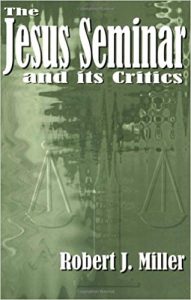I’m back to blogging again after being seconded to actually do certain household maintenance jobs I had been promising and giving much on-and-off thought to for some weeks now. (I’m a firm believer in not rushing into certain tasks without careful and protracted thought beforehand.)

When I returned to the online world I found that a kind emailer had sent me a chapter from a certain book I am surprised I have not read yet. Even better, I noticed that the local library only a few blocks away has a copy of the whole book. Here is a section of it that addresses a certain theme relating to the world of biblical scholars that I’ve posted about before:
Some critics take a dim view of the [Jesus] Seminar’s practice of voting on the authenticity of the sayings and deeds attributed to Jesus. For example, Ben Witherington complains that only in a country where majority views are assumed to be right and where “truth” is decided by voting could this idea of voting on Jesus have arisen. However, as The Five Gospels explains, the Jesus Seminar got the idea, not from American democracy, but from the practice of various biblical translation committees and from the United Bible Society committees that vote on the critical edition of the Greek text of the New Testament.
Luke Johnson has no objection to translation committees voting because “these votes are carried out privately.” Johnson’s remark is revealing: it shows that for him the real offense of the Jesus Seminar is not that it votes, but that it does its work in public. Numerous snide comments about the Seminar being hungry for publicity show that other critics also resent the public face of the Seminar.
In an attempt to estimate the depth of this resentment, let me pose a hypothetical scenario. What if the same people in the Jesus Seminar had carried out the same project and had come up with the same results, but had done so in a Society of Biblical Literature seminar and published the results in Semeia, the Society’s journal for experimental scholarship? Certainly the public would not have paid any attention, but my question is: how much attention would this project have received from scholars? I suspect, but obviously cannot prove, that the quantity of the critical response would be much less and its quality much better. I suspect also that the sheer nastiness of the insulting rhetoric directed against the Seminar would be much reduced.
The acerbic response of the Seminar’s critics to its commitment to work in public seems to rest on the assumption that academics who speak publicly about religion should keep their views to themselves if they might be unsettling to the beliefs of mainstream Christians. (This assumption explains why biblical scholars have largely left it up to scientists to battle creationism in the public forum.) The fact that journalists who cover religion could register such shock when scholars use words like “non-historical” (or, worse yet, “fiction”) to characterize some gospel passages shows what a good job biblical scholars have done keeping their secrets to themselves.
Miller, Robert J. 1999. The Jesus Seminar and Its Critics. Santa Rosa, Calif: Polebridge Press. pp. 65f
Then we come to the end of the chapter,
The Conduct of Scholars
The last issue I wish to address has to do not with the content of scholarship, but the conduct of scholars. As you may have noticed from the quotations excerpted in this chapter, some critics of the Seminar denounce it in language that is rancorous and sometimes venomous. The polemical rhetoric of these critics is the ugliest I have ever encountered in scholarly writing.
The operative assumption of these scholars and of the editorial committees who approve their writing for publication is that it is proper not only to attack opponents’ ideas but also to insult them personally, to impugn their intellectual honesty, their moral integrity, and even their religious commitments. Perhaps I am saddened more than others by this verbal abuse because I belong to the group at which it is aimed. So I leave it to you to decide whether language like this brings shame on those at whom it is directed or on those from whom it comes.
The pettiness and nastiness of some of the criticisms of the Seminar shows that the Seminar’s work has drilled into a nerve. The issues at stake are more than academic and it is natural that many have strong feelings about them. That is no excuse, however, for debasing the discussion with personal attacks. The spectacle of biblical scholars slinging mud at one another may be entertaining to some, but incivility in scholarly discourse distracts attention and energy from the real task, that of increasing our understanding.
I trust that everyone in the historical Jesus debate, regardless of his or her religious beliefs, sincerely desires to increase our understanding of Jesus and does so out of respect for him and what he has left us. Jesus’ teaching is unambiguous about how we should relate to opponents. Honest disagree- ment is not to be avoided, for it can lead to greater understanding. What we disagree about is indeed important, but so is how we disagree. I hope we can conduct this debate about Jesus in a manner that honors his teaching and his memory.
Miller, Robert J. 1999. The Jesus Seminar and Its Critics. Santa Rosa, Calif: Polebridge Press. pp. 76f
I really do sometimes wish Christian scholars were nicer people. They don’t seem to have changed their tone towards “outsiders” very much since Tertullian.
If you enjoyed this post, please consider donating to Vridar. Thanks!


Yep, all good points. On a side note, I’m currently reading Miller’s [i]Helping Jesus Fulfill Prophecy[/i], which is quite good: https://www.westarinstitute.org/blog/helping-jesus-fulfill-prophecy/
It is indeed quite a helpful book by Miller. Tons of insights and I like the way he goes about discussing the issues of “fulfilled” prophecy. You won’t be disappointed.
Clearly, when you don’t have actual arguments to make, ad hominum attacks are all that is available.
How much hate has been poured on the subsequent Acts Seminar? I’ve just finished re-reading the final report and Pervo’s “The Mystery of Acts”, and their conclusions seem even more damning for ‘conservative scholarship’.
Donald Akenson torpedoed the Jesus Seminar definitively for me in Appendix D of Surpassing Wonder. See Notes 8 and 9 particularly. Pooh and Piglet’s Woozle hunt, pp539-540, is an apposite metaphor for the “Quest for the Historical JesusTM”; though I disagree obviously that:
The Five Gospels certainly isn’t Tyndale. Never mind the scholarship; I’d indict the Jesus Seminar on crimes against the English language alone.